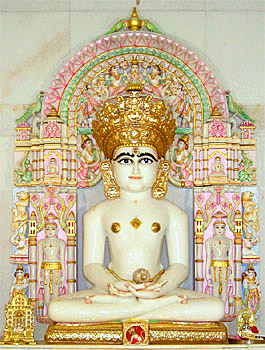 The word `Nirvana` is derived from the Sanskrit word `nirvan` meaning, "to cease blowing" or "extinguishing". Nirvana in Jainism connotes the final release from the bondage of Karma. Nirvana is depicted as the annihilation of remaining `aghatita karmas` of the enlightened human being and this process of annihilation is followed by the cessation of his mundane existence. The term is described as the liberation of the soul of the enlightened human being. This attainment of liberation leads to `moksha` and the human entity reaches the status of `Siddha`.
The word `Nirvana` is derived from the Sanskrit word `nirvan` meaning, "to cease blowing" or "extinguishing". Nirvana in Jainism connotes the final release from the bondage of Karma. Nirvana is depicted as the annihilation of remaining `aghatita karmas` of the enlightened human being and this process of annihilation is followed by the cessation of his mundane existence. The term is described as the liberation of the soul of the enlightened human being. This attainment of liberation leads to `moksha` and the human entity reaches the status of `Siddha`.
Although the concept of Nirvana is referred to as the process of annihilation but it does not indicate the extinction of the soul. In Jainism Nirvana refers to the soul`s entry into a state of blessedness that has no end. The `Nirvana` is an escape from the body, though not from existence. According to this Jain philosophy the soul avoids emotions after the attainment of `moksha` and `nirvana.` It is this process that renders it characterless, with no interest in the lives of its fellows or inclination to help them. The Jain school of thought describes the soul that attained Nirvana as liberated and it "is not long nor small . . . nor black, nor blue, nor bitter, nor pungent: neither cold nor hot…. Without body, without rebirth ... he perceives, he knows, but there is no analogy, its essence is without form; there is no condition of the unconditioned."
The `siddha,` thus, is absolutely unconditioned. Nothing positive can be said about the freed or liberated soul and neither the plurality of liberated souls can be admitted. In Jainism the state of perfection of mind is passively depicted as freedom from action and desire; a state of utter and absolute quiescence, a rest that knows no change or ending; it is passionless and attains an ineffable peace. The influence and energy of past karma is decimated, and the spirit, though still existent, has no chance of re-embodiment.
According to the philosophy of Nirvana in Jainism, the liberated soul possesses infinite consciousness, pure understanding, absolute freedom and eternal bliss. The soul can perceive and discern. In fact perception and knowledge are functions of the soul. The liberated soul has a beginning but no end but a bound soul has no beginning but has an end. The liberated souls are the one in status. In comparison to the liberated souls, the bound souls can not get out of the prosaic world, get involved in the terrestrial activities and activities, hence cannot attain the oneness of existence and fail to unite with the cosmic energy.
The attainment of `Moksha` in Jainism is defined as the eternal upward movement. The liberation of the soul moves the soul upward and helps to awaken the supreme qualities of the universe whereas the bound soul cannot head towards upward because of its inability to break off the worldly emotional bonding and other relative possessions.
According to Jain philosophy Nirvana can be attained through ascetic practises and by following the Three Jewels. However for the laymen it requires eight reincarnations to achieve `moksha` or salvation. The ascetics can reach this elevated within a span of twelve years.












